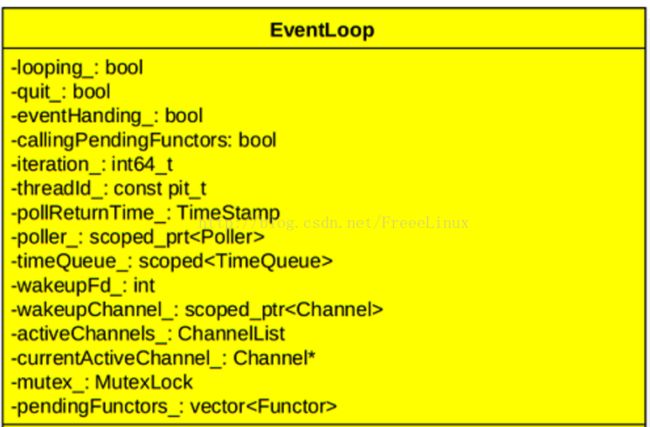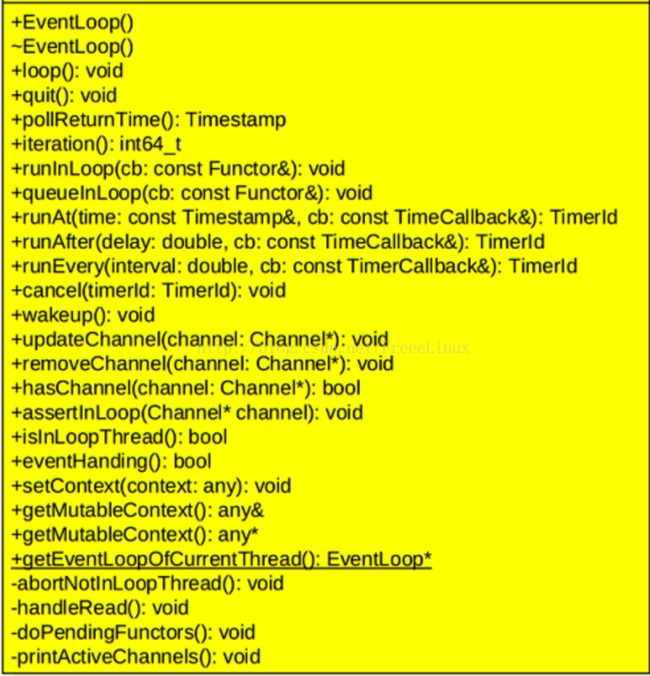muduo库的EventLoop类剖析
本文地址:http://blog.csdn.net/freeelinux/article/details/53510541
一:采用的线程通信机制
首先来看一下一个进程(线程)如何通知另一个个等待中的(线程),有三种方法:
1.pipe,使用fd[0] 为读端,fd[1]为写端,半双工。等待线程关注fd[0]的可读事件。
2.socketpair,也有一对文件描述符,可用于双向通信,全双工。
3.eventfd。eventfd是一个比pipe更搞笑的线程间事件通知机制,一方面它比pipe少用一个pipe descriptor,节省了资源。另一方面,eventfd的缓冲区管理也简单的多,全部“buffer"
只有定长8bytes,不想pipe那样可能有不定长的真正buffer。
实际上线程还可以使用条件变量condition来实现消息通信。
muduo采用的就是eventfd,来看一下它的函数:
#include
int eventfd(unsigned int initval, int flags);
第一个参数是初始值,一般设置为0,后面是O_NONBLOCK之类的标志。
简单来说eventfd就是一个文件描述符,它引用了一个内核维护的eventfd object,是uint64_t类型,也就是8个字节,可以作为counter。支持read,write,以及有关epoll等操作。
该值不为0,read就可以读了。
关于eventfd更多内容参考我的博客:http://blog.csdn.net/freeelinux/article/details/53511331
二:EventLoop剖析
EventLoop是整个muduo网络库的核心类,其重要性不言而喻。首先来看一下它的类图:
图片来自:http://blog.csdn.net/KangRoger/article/details/47266785
我们来看一下EventLoop的主要成员:
typedef std::vector ChannelList;
bool looping_; /* atomic */ //loop循环标志
bool quit_; /* atomic and shared between threads, okay on x86, I guess. */ //是否退出标志
bool eventHandling_; /* atomic */ //是否在处理事件标志
bool callingPendingFunctors_; /* atomic */ //是否调用pendingFunctors标志
int64_t iteration_; //迭代器
const pid_t threadId_; //当前所属对象线程id
Timestamp pollReturnTime_; //时间戳,poll返回的时间戳
boost::scoped_ptr poller_; //poller对象
boost::scoped_ptr timerQueue_; //TimerQueue类型对象指针,构造函数中new
int wakeupFd_; //用于eventfd,线程间通信
// unlike in TimerQueue, which is an internal class,
// we don't expose Channel to client.
boost::scoped_ptr wakeupChannel_; //wakeupfd所对应的通道,该通道会纳入到poller来管理
boost::any context_; //暂未剖析
// scratch variables
ChannelList activeChannels_; //Poller返回的活动通道,vector类型
Channel* currentActiveChannel_; //当前正在处理的活动通道
MutexLock mutex_;
std::vector pendingFunctors_; // GuardedBy mutex_ //本线程或其它线程使用queueInLoop添加的任务,可能是I/O计算任务
然后下面是它的构造函数:
EventLoop::EventLoop()
: looping_(false), //表示还未循环
quit_(false),
eventHandling_(false),
callingPendingFunctors_(false),
iteration_(0),
threadId_(CurrentThread::tid()), //赋值真实id
poller_(Poller::newDefaultPoller(this)), //构造了一个实际的poller对象
timerQueue_(new TimerQueue(this)), //构造一个timerQueue指针,使用scope_ptr管理
wakeupFd_(createEventfd()), //创建eventfd作为线程间等待/通知机制
wakeupChannel_(new Channel(this, wakeupFd_)), //创建wakeupChannel通道,
currentActiveChannel_(NULL)
{
LOG_DEBUG << "EventLoop created " << this << " in thread " << threadId_;
if (t_loopInThisThread) //每个线程最多一个EventLoop对象,如果已经存在,使用LOG_FATAL终止abort它。
{
LOG_FATAL << "Another EventLoop " << t_loopInThisThread
<< " exists in this thread " << threadId_;
}
else
{
t_loopInThisThread = this; //this赋给线程局部数据指针,凭借这个这以保证per thread a EventLoop
}
//设定wakeupChannel的回调函数,即EventLoop自己的的handleRead函数
wakeupChannel_->setReadCallback(
boost::bind(&EventLoop::handleRead, this));
// we are always reading the wakeupfd
wakeupChannel_->enableReading();
}
构造函数中创建了一个wakeupFd以及wakeupChannel。之前我们说过Channel类的生命周期由TCPConnection,Acceptor类管理,唯有这个wakeupChannel类不同。这个类和
EventLoop类是组合关系,是EventLoop中的对象,所以它的生命周期由EventLoop负责。实际上,它就是EventLoop类中用来自己给自己通知的一个通道,它利用同是类成员的
wakeupFd_构造,负责提供线程间等待/通知机制。接下俩会具体说。
来看一下EventLoop类的核心函数loop()函数:
//事件循环,不能跨线程调用
//只能在创建该对象的线程中调用
void EventLoop::loop()
{
assert(!looping_);
assertInLoopThread(); //断言处于创建该对象的线程中
looping_ = true;
quit_ = false; // FIXME: what if someone calls quit() before loop() ?
LOG_TRACE << "EventLoop " << this << " start looping";
while (!quit_)
{
activeChannels_.clear(); //首先清零
pollReturnTime_ = poller_->poll(kPollTimeMs, &activeChannels_); //调用poll返回活动的通道,有可能是唤醒返回的
++iteration_;
if (Logger::logLevel() <= Logger::TRACE)
{
printActiveChannels(); //日志登记,日志打印
}
// TODO sort channel by priority
eventHandling_ = true; //true
for (ChannelList::iterator it = activeChannels_.begin();
it != activeChannels_.end(); ++it) //遍历通道来进行处理
{
currentActiveChannel_ = *it;
currentActiveChannel_->handleEvent(pollReturnTime_);
}
currentActiveChannel_ = NULL; //处理完了赋空
eventHandling_ = false; //false
//I/O线程设计比较灵活,通过下面这个设计也能够进行计算任务,否则当I/O不是很繁忙的时候,这个I/O线程就一直处于阻塞状态。
//我们需要让它也能执行一些计算任务
doPendingFunctors(); //处理用户回调任务
}
LOG_TRACE << "EventLoop " << this << " stop looping";
looping_ = false;
}
我们来看一下,位于Channel.cc中:
//处理所有发生的事件,如果活着,底层调用handleEventWithGuard
void Channel::handleEvent(Timestamp receiveTime) //事件到来调用handleEvent处理
{
boost::shared_ptr guard;
if (tied_)
{
guard = tie_.lock();
if (guard)
{
handleEventWithGuard(receiveTime);
}
}
else
{
handleEventWithGuard(receiveTime);
}
}
看一下这个函数:
//处理所有发生的事件
void Channel::handleEventWithGuard(Timestamp receiveTime)
{
eventHandling_ = true;
LOG_TRACE << reventsToString();
if ((revents_ & POLLHUP) && !(revents_ & POLLIN)) //判断返回事件类型
{
if (logHup_) //如果有POLLHUP事件,输出警告信息
{
LOG_WARN << "fd = " << fd_ << " Channel::handle_event() POLLHUP";
}
if (closeCallback_) closeCallback_(); //调用关闭回调函数
}
if (revents_ & POLLNVAL) //不合法文件描述符,并没有终止,因为服务器程序要保证一天二十四小时工作。
{
LOG_WARN << "fd = " << fd_ << " Channel::handle_event() POLLNVAL";
}
if (revents_ & (POLLERR | POLLNVAL))
{
if (errorCallback_) errorCallback_();
}
if (revents_ & (POLLIN | POLLPRI | POLLRDHUP)) //POLLRDHUP是对端关闭连接事件,如shutdown等
{
if (readCallback_) readCallback_(receiveTime);
}
if (revents_ & POLLOUT)
{
if (writeCallback_) writeCallback_();
}
eventHandling_ = false; //处理完了=false
}
没错,它实际上就是用来处理fd相应的事件,执行相应回调函数的。这些函数我们在fd注册的时候同时注册过,现在事件发生了,就执行相应的回调就行了。
到目前为止,实际上EventLoop完成了它的主要功能了。主要功能就是使用epoll等待事件,事件发生处理事件,然后回去再进行epoll_wait()就可以了,基本功能就是这样。
不过还是要继续往下看,EventLoop还有它额外的功能,此时再回到loop()函数,它会执行到最后一句,是一个函数调用:
doPendingFunctors(); //
这个函数是用来干什么的呢?其实他是用来让I/O线程执行额外的计算任务的,因为如果没有事件发生,I/O线程会一直处于I/O空闲状态,这个时候我们可以利用I/O线程来执行一些额外的任务。先说一下大概流程:
假设我们有这样的调用:loop->runInLoop(run),说明想让IO线程执行一定的计算任务,此时若是在当前的IO线程,就马上执行run();如果是其他线程调用的,那么就执行
queueInLoop(run),将run异步添加到队列,当loop内处理完事件后,就执行doPendingFunctors(),也就执行到了run();最后想要结束线程的话,执行quit。
我们在看doPendingFunctors()函数之前先来看一下runInLoop()函数:
//顾名思义,在I/O线程中调用某个函数,该函数可以跨线程调用
void EventLoop::runInLoop(const Functor& cb)
{
//如果是在当前I/O线程中调用,就同步调用cb回调函数
if (isInLoopThread())
{
cb();
}
else
{
//否则在其他线程中调用,就异步将cb添加到任务队列当中,以便让EventLoop真实对应的I/O线程执行这个回调函数
queueInLoop(cb);
}
}
下面是queueInLoop()函数:
//将任务添加到队列当中,队就是成员pendingFunctors_数组容器
void EventLoop::queueInLoop(const Functor& cb)
{
{
MutexLockGuard lock(mutex_);
pendingFunctors_.push_back(cb); //添加到任务队列当中
}
//如果当前调用queueInLoop调用不是I/O线程,那么唤醒该I/O线程,以便I/O线程及时处理。
//或者调用的线程是当前I/O线程,并且此时调用pendingfunctor,需要唤醒
//只有当前I/O线程的事件回调中调用queueInLoop才不需要唤醒
if (!isInLoopThread() || callingPendingFunctors_)
{
wakeup();
}
}
加入要执行的事件到队列中后,我们当然希望I/O线程立刻执行该任务,所以立刻调用wakeup函数,唤醒I/O线程,具体实现是这样的:
//唤醒EventLoop
void EventLoop::wakeup()
{
uint64_t one = 1;
ssize_t n = sockets::write(wakeupFd_, &one, sizeof one); //随便写点数据进去就唤醒了
if (n != sizeof one)
{
LOG_ERROR << "EventLoop::wakeup() writes " << n << " bytes instead of 8";
}
}
一看调用了write,且文件描述符为wakeupFd_,我们就知道这是往我们之前的eventfd写一点数据,实现等待/通知,去触发该fd可读。
我们再回头看一下EventLoop的构造函数,有这么两句:
//设定wakeupChannel的回调函数,即EventLoop的handleRead函数
wakeupChannel_->setReadCallback(
boost::bind(&EventLoop::handleRead, this));
// we are always reading the wakeupfd
wakeupChannel_->enableReading();
这几句可以说是合成了一个eventfd的通道Channel。所以会把它注册如Poller关注的事件里面。结果我找了几分钟没找到(这里有点遗憾,我之前框架都剖析过几次了,这过了一天就忘了),实际上它的这样注册进去的:
它调用Channel的成员函数enableReading()函数:
void enableReading() { events_ |= kReadEvent; update(); } //或上事件,就是关注可读事件,注册到EventLoop,通过它注册到Poller中
然后底层实际上是这样子:
void Channel::update() //更新事件类型
{
addedToLoop_ = true;
loop_->updateChannel(this); //调用loop的,loop再调用poll的注册pollfd
}
下面就不分析了,无非就是注册进epoll事件当中。
所以上面调用了write向eventfd写入几个字节后,EventLoop中poll会返回,然后开始进行事件处理,这次事件是wakeupFd产生的事件,loop()中这样执行:
currentActiveChannel_ = *it;
currentActiveChannel_->handleEvent(pollReturnTime_);//实际上是wakeFd_的读回调函数
void EventLoop::handleRead()
{
uint64_t one = 1;
ssize_t n = sockets::read(wakeupFd_, &one, sizeof one);
if (n != sizeof one)
{
LOG_ERROR << "EventLoop::handleRead() reads " << n << " bytes instead of 8";
}
}
pendingFunctors_这个容器数组加入任务时,通过eventfd通知I/O线程从poll状态退出来执行I/O计算任务。
执行完eventfd的handleRead接下来就是loop()函数中处理任务函数了,就是最后一句:
doPendingFunctors(); //处理用户回调任务
看下它的实现:
// 1. 不是简单的在临界区内依次调用functor,而是把回调列表swap到functors中,这一方面减小了
//临界区的长度,意味着不会阻塞其他线程的queueInLoop(),另一方面也避免了死锁(因为Functor可能再次调用quueInLoop)
// 2. 由于doPendingFunctors()调用的Functor可能再次调用queueInLoop(cb),这是queueInLoop()就必须wakeup(),否则新增的cb可能就不能及时调用了
// 3. muduo没有反复执行doPendingFunctors()直到pendingFunctors为空,这是有意的,否则I/O线程可能陷入死循环,无法处理I/O事件
void EventLoop::doPendingFunctors()
{
std::vector functors;
callingPendingFunctors_ = true;
//注意这里的临界区,这里使用了一个栈上变量functors和pendingFunctors交换
{
MutexLockGuard lock(mutex_);
functors.swap(pendingFunctors_); //把它和空vector交换
}
//此处其它线程就可以往pendingFunctors添加任务
//调用回调任务
//这一部分不用临界区保护
for (size_t i = 0; i < functors.size(); ++i)
{
functors[i]();
}
callingPendingFunctors_ = false;
} 
